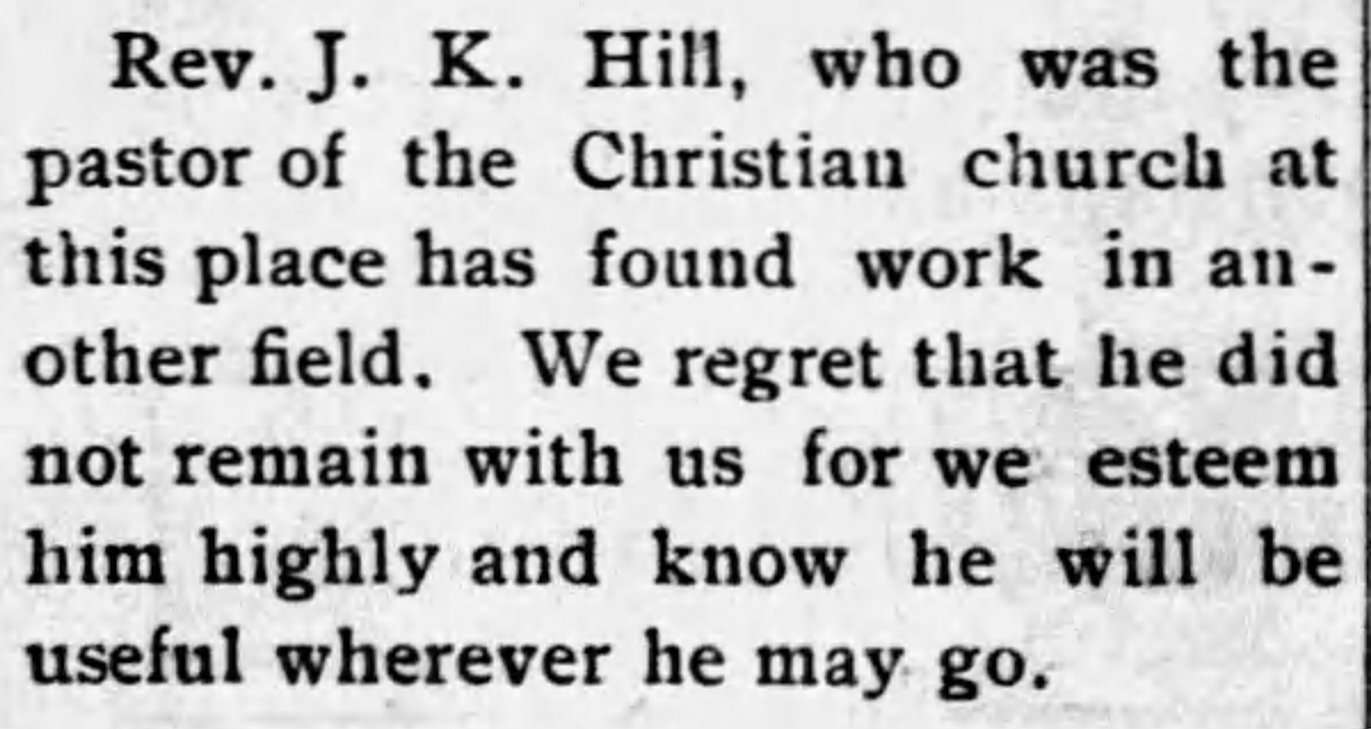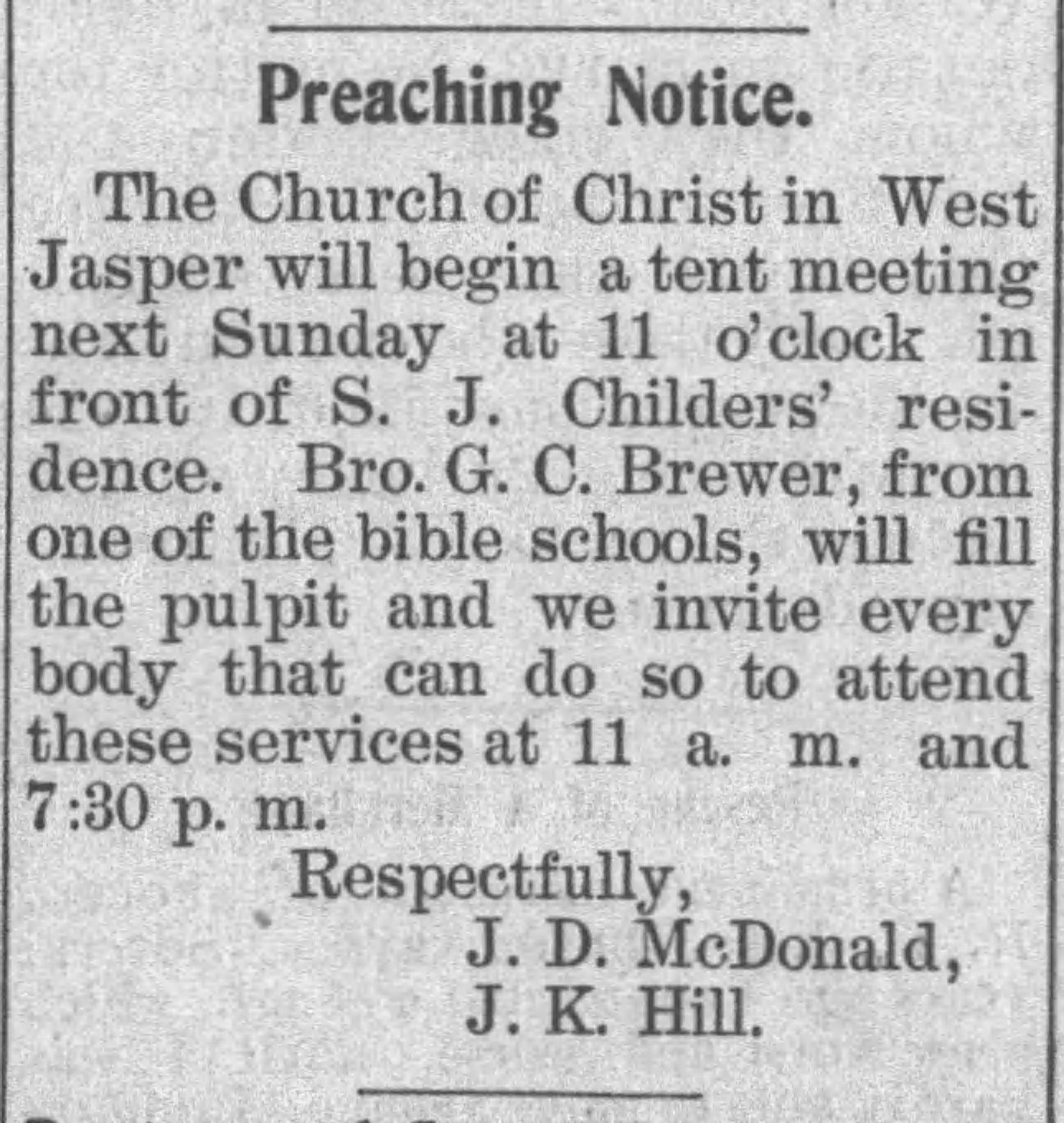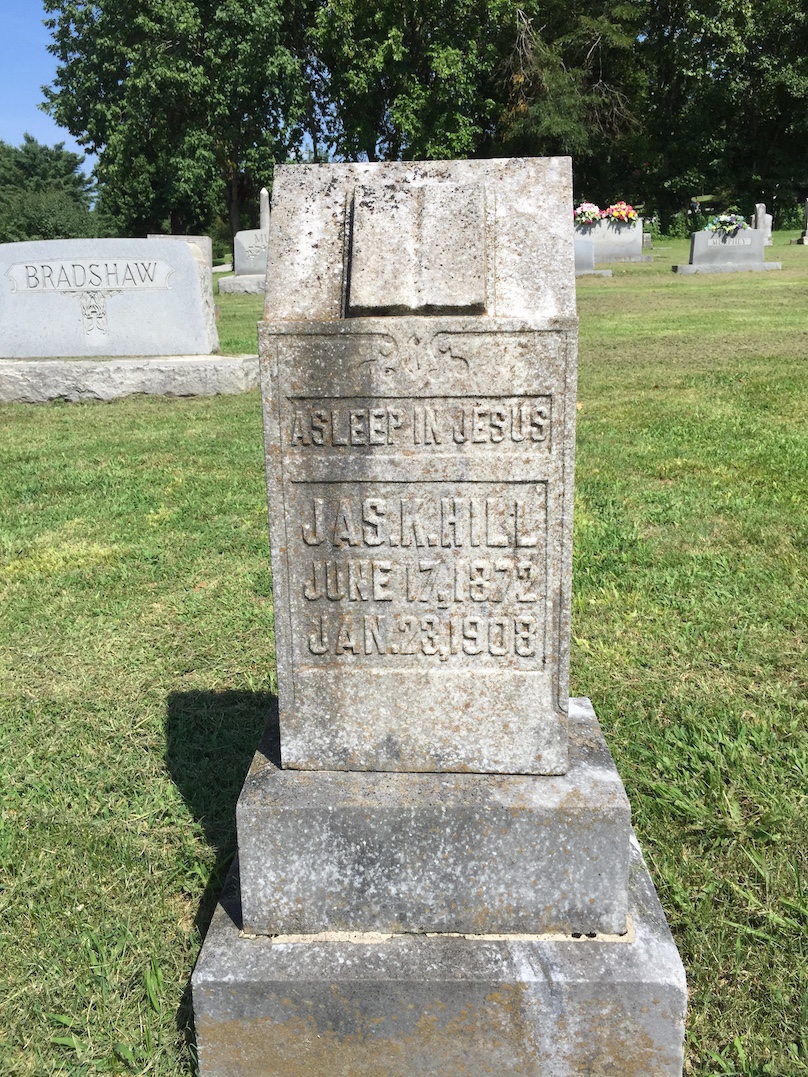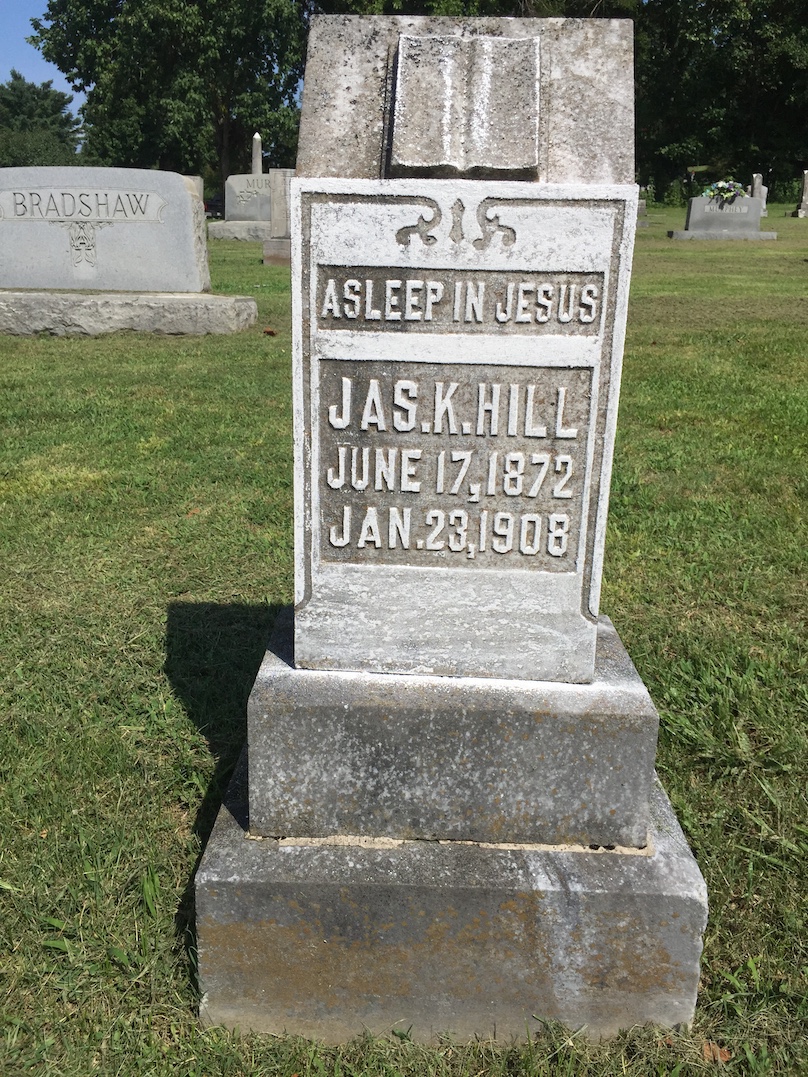James K. Hill
1872-1908
[need photo]
![]()
The Life Of James K. Hill
James K. Hill was born June 17, 1872 at Tucker's Crossroads, Wilson County, Tennessee. He was the seventh of eight children born to John M. Hill (1836-1904) and Susan Holman Allen (1840-1907). It is not known what the "K" in his middle name stood for, as nowhere in this author's resources has revealed it. It may have stood for Knox, as it was the middle name of another famous Tennessean, the eleventh president of the United States of America, James K. Polk (1795-1849).
James' parents were married September 16, 1858. Before the marriage, John was a deeply pious young man, having joined the Baptist church while in his teens. Not long after he married, and from his own studies of the Scriptures, he determined to withdraw from the Baptist church and devote himself entirely to being only a Christian, doing Bible things in Bible ways. So sensitive he was to Biblical authority, he determined to be immersed again, and was at the hands of Isaac Sewell in 1860. This is the kind of atmosphere James and his siblings were exposed to while growing to maturity.
Life in the Hill home centered around Bethlehem church of Christ, south of Lebanon. It was the oldest church of its kind in Wilson County, Tennessee. According to congregation historian and long time member, Emily J. Blair, the church began after 1832, and that Calvin Curlee and John Bonner were among the first preachers. It was said that J. J. Trott and Sandy E. Jones preached in the dead of winter around piles of burning logs, just to set the work in order. It was claimed that Barton W. Stone preached there some. J. K. Speer, John D. Eichbaum, and Tolbert Fanning had helped to mature the work in the early years. James and his siblings grew up hearing their father teach the Bible lessons for the church and taking lead as one of its elders. In his youth, he and his siblings were exposed to some of the finest preachers the church that day had to offer, like E. A. Elam, J. M. Kidwell, Elisha Sewell, and many more. It was at the preaching and hands of F. B. Srygley that twelve year old James put his Lord on in baptism. (Note: a good summary of the work at Bethlehem appeared in the Gospel Advocate, April 30, 1903, p. 279, written by John M. Hill)
Just a short distance to the west of Tucker's Crossroads lies the city of Nashville. It was there that David Lipscomb and James A. Harding started Nashville Bible School October 5, 1891. Not at the very first but, early in its existence, James K. Hill determined to go and sit at the feet of the great educators there. Both, he and his brother John H. were to become excellent preachers of the gospel. One report stated, "Ridge Post, Tenn., Aug. 15. — Our meeting closed last Lord's-day at night with a crowded house, Bro. J. K. Hill, of Tucker's Cross Roads, Tenn., doing the preaching. Visible results: four confessed and were baptised, one took membership. Bro. Hill is one of the Nashville Bible School boys, and a good one he is. Bros. Harding and Lipscomb are certainly doing a grand work by educating the boys to preach the word. When they leave the school they are full of Christ and the gospel, and not societyism. Love to all the faithful. Sherman Sexton." (Christian Leader, 08.25.1896, p.12)
After leaving school, James was stationed at home, but branched out, traveling around to preach for churches that could use his talents. One early report in his ministry appeared in the October 27, 1898 issue of GA expressing, "the church at Manchester, Tenn., has arranged to keep him in the field during November and December, and then for a year, the work to begin in April." (p. 681). This suggests what was clearly seen from further reports that the brethren believed in brother Hill's abilities enough to financially back him in his missionary work. Around the turn of the 20th century many reports were sent in by he and his brother of their preaching efforts in different places. They went from town to town and stayed as long as needed and then pressed on to other areas.
Early in 1899, James headed down to Jasper, Florida, near the Georgia state line. He preached eleven lessons and assisted in six additions. H. A. Lashley reported, "Brother Hill is an able speaker, and contends for the one faith and one body. It will be edifying to any congregation to hear him and have him preach for them." (GA,03.23.1899, p.189). In July, the following was reported from Thomas J. Belcher, "Viola, July 11.—I am glad to report the work of our evangelist, Brother J. K. Hill. Since beginning in April, he has held meetings at Altamont, Beersheba Springs, and Tatesville, Tenn., very great interest being manifested at all these places. On June 1 he began a meeting at Chestnut Grove, Tenn., three miles from Viola, and continued for nine days. The result was six additions and a congregation established. On July 5 he closed a meeting at Mud Creek, near Summitville, Tenn., resulting in six additions, and is now engaged in a meeting in Cannon County, Tenn. The home congregations at Viola and Manchester are very much interested and encouraged." (GA, 07.20.1899, p.461)
Soon after the turn of the century, brother Hill made his way into North Alabama. His brother, John H., had moved to Landersville, between Moulton and Russellville. In 1906, the two worked together planting works and preaching among existing ones. One report spoke of an effort they did together at Bear Creek in Marion County, resulting in five additions. (GA,09.06.1906, p.565). Another report showed James preaching in Marion County at Brinn and the Whitehouse congregation, which was the oldest church in the county, planted by Green Haley, many years previous. The Oakman church in Walker County soon became his home church. It was his habit to preach there and for surrounding churches through most of the year, but in the summers he traveled to evangelize in wider fields. He worked closely with other preachers in the area, such as C. A. Wheeler, E. J. Pinegar and a young G. C. Brewer.
A most interesting story appeared in the autobiographical work of brother Brewer, Forty Years On The Firing Line. In the first chapter, he related a story of a debate he had in southern Walker County, Alabama in 1906. A strong Baptist influence saturated the region. Brewer was a young preacher of 21, and was having some success, much to the chagrin of the local denominations. A debate arose between he and one of the older Baptist preachers, L. H. Baker. His moderator for the discussion on the church was another Baptist preacher named T. Ernest Pinegar. Brewer's moderator was James K. Hill. As stories about Hill's life are few, it seems good to related his involvement in the debate. In his own words, G. C. Brewer wrote the following,
"As Mr. Baker was affirming the first day, Pinegar acted as master of ceremonies and opened the debate. He apologized profusely for Mr. Baker in that he was meeting a "beardless boy." He openly expressed doubt that this boy would be able to last very long; but he said that the Campbellites had put him up and he supposed that they were willing for him to represent them in this debate and, if so, they must take the consequence. He continued to repeat things of this kind and Brother Hill arose and said that it was definitely understood that the debate was to be between Mr. L. H. Baker and our young Brother G. C. Brewer, that he and his brethren were perfectly willing to leave the matter in my hands and that Mr. Pinegar might proceed with the program and let the debate begin. When Brother Hill sat down, Pinegar, with a sarcastic smirk and in sneering tones, asked the audience if they understood that and took them to witness that Hill--he did not say Brother Hill or Mr. Hill, but he shook a long finger at Brother Hill and said, "Hill says they'll leave their cause in the hands of this beardless boy;" and he called the audience to witness again that the debate was to be between Baker and Brewer and that Hill and all others should keep out of it. He then read the proposition and introduced Baker. Baker also opened with an apology for debating with a ''beardless boy," and he too called the audience to witness that the moderator—he was much more respectful than Pinegar—had said that the debate was to be left "in the hands of this boy so far as the Campbellite side was concerned." Baker then made the usual arguments about the establishment of the church. He couldn't set it up anywhere, but he tried to find it in existence before the death of Christ.
"When his time expired, I sprang to the floor speaking, and I first referred to their many apologies for meeting a "beardless boy." Then I turned to Pinegar and Baker and said, "Gentlemen, if it's whiskers you want, we'll get you a billy goat; but, if it's Bible you want, there is no need of all these preliminaries and apologies. I'm ready to tell you what the Bible says on this question." I then began answering the arguments that Baker had made. Once or twice while I was answering these points, Pinegar arose to a point of order and took up time trying to confuse me. After I had said all I knew to say in answer to what Baker had presented, I began reciting at a rapid rate the negative arguments that are given in Johnson's "Great Controversy." (Ashley Johnson's book on debating denominations, SDH). As I remember, there are some sixty-five arguments given in negative form of why the church could not have been established before Pentecost. I had committed every one of these arguments to memory and I was singing them off. While I was going, I looked down and Baker and Pinegar and Gimlet Will Ernest and two or three others had their heads together and they were all writing as rapidly as they could and one of them spoke out loud and said, "What was that reference?" and Pinegar answered him.
"I paused for a moment and pointed to the group, but they were still so busy writing and talking to each other that they didn't realize that I had quit speaking. I stood pointing to them for a few seconds and then said, "I want to call the audience to witness that this debate is between Mr. L. H. Baker and the 'beardless boy' and others must keep out of it."
"When I said this, the audience burst into a roar of laughter and Pinegar sprang into the pulpit, shook his fist in my face and told me I was out of order. I told him I was in good order but that it was very evident that he was rapidly getting out of order and if he didn't calm down we would have to have a physician to get him in order. But this cross fire would have flamed into something worse if Brother Hill and Uncle Andy Hanley had not both sprung between us and made Pinegar sit down and told me to proceed.
"I started again and I cited the passage where Jesus forbade his disciples to tell any man that he was the Christ (Matt. 16 :20), and I said, "If the church was set up before the death of Christ, the disciples were not permitted to tell who the founder was or to tell anybody that the Head of the church was the Son of God." And I said, "I wonder if Mr. Baker thinks the Lord established a secret order." Then I happened to remember that Baker was a lecturer for the Farmers' Union, and I said, "Perhaps Mr. Baker thinks our Lord established a Farmers' Union."
"When I said that, Pinegar sprang to the pulpit, shook his finger in my face and said, "I'll have you to know, sir, that the Farmers' Union is not in this debate; but, if any time, sir, you would like to debate the Farmers' Union," and he reared back and put his thumbs in his lapels and said, "I am the State Lecturer of Alabama for the Farmers' Union."
"I said, "I meant no reflection on the Farmers' Union, but I am glad I gave you an opportunity to tell the audience that you are the State Lecturer. Ladies and gentlemen, behold the State Lecturer! No, I meant no reflection on the Farmers' Union but, if it is a reproach to the Farmers' Union to compare it to the Baptist Church, I apologize."
"Pinegar rushed at me and again my moderator and the chairman moderator carne between us.
"As we went on, I again presented one of Johnson's arguments showing that the church is married to Christ (Rom. 7:4). Then, if the church was established before the death of Christ, she was a widow for three days and nights. When Baker came back to the floor, he didn't have much to say about these arguments presented from Johnson but he did seize upon this argument about the church being a widow.
"He said, "Yes, thank God, the church was a widow and that proves that she was here already married to Christ before Christ died, otherwise she couldn't be a widow." And, to prove that the church was a widow, he ran back to the fifty-fourth chapter of Isaiah and read what is there said about the widowhood of Israel; and, feeling that he had scored a victory, he continued to shout that the church he belonged to was a widow and he thanked God that he belonged to a church that was a widow.
"This took me by surprise, since I didn't know anything about the widowhood of Israel and didn't remember that I had ever heard that Scripture alluded to; but I replied that this had no reference to the Lord Jesus Christ but that it was speaking of ancient Israel, that it had to do with God's people hundreds of years before Jesus was born; that passage referred to the Jews and not to the church.
"But then I said, "Mr. Baker tells us that the church he belongs to is a widow, and he rejoices in the fact that his church is a widow," Then I said, "Well, I always knew there was something wrong with the Baptist Church but I never knew before what it is--now I see. She's wanting to marry again."
"Then I asked Baker and Pinegar where they thought they would find a husband for their church that is now a widow, I told them that John was dead and that, therefore, if the Baptist Church married again, she would even have to change her name. But, before I got further, Pinegar was up again and this time we went together like dogs, and again our moderators found occasion to be active.
"The reader can see that this was not a very orderly debate; but, if any reader imagines that it wasn't a lively debate, he had better ask someone who lives in Walker County, Alabama.
"That debate is still the talk of the people in that section. There were many other things of interest that occurred in the debate, but this is enough to give the reader an idea of how it was conducted." (G. C. Brewer, Forty Years On The Firing Line, pages 20-24.)
Brother Hill reported the debate to the Gospel Advocate. Of Brewer he wrote, "The brethren were delighted with the strong fight he made, and the discussion is sure to result in much good for the cause in that community. The speakers conducted themselves as becomes Christian gentlemen, and the very best of feeling prevailed throughout. Large audiences were in attendance upon every session. T. E. Pinegar, moderator for Mr. Baker, and the writer, who served in the same capacity for Brother Brewer, will engage in a four-days' debate at the same place, beginning on February 5, 1907. The setting up of the church will be the subject under consideration." (GA, 12.06.1906,p.782)
By way of observation, it appears from brother Hill's report of the debate that he determined not to report the lively exchanges between the "beardless preacher" and the Baptist moderator T. E. Pinegar. Perhaps two or three reasons is worth considering. One, was that his brother Elda Joseph "Eldy" Pinegar (1875-1961), was a member of the church of Christ in Cordova, Alabama, and was already doing some preaching at this stage. Another reason for his genteel descriptions may have been that brother Hill was planning to meet Pinegar in a debate within a couple of months. Also, this debate had not been brother Hill's first encounter with T. E. Pinegar. The scrappy missionary Baptist preacher had already met Joe S. Warlick in a debate in 1903 in Oak Grove, Alabama. It had been brother Warlick's first visit to Alabama, and brother Hill had served as his moderator during that discussion. (GA,11.26.1903,p.767)
Just as a side note, the Brewers held brother Hill in high regard for his preaching ability, but he was also a family friend. Both G. C. and Charlie Brewer later reflected their appreciation for him for baptizing their younger brother William Calvin Brewer in Florence, Alabama in 1902. He also had performed the marriage ceremony for their sister, Lillie Belle to Eulous L. Key on November 15, 1905.
At the end of 1906, James had to make his way back home to Tennessee. His mother was ill, and it led to her death on January 1st. But, if that was not bad enough, an even more pressing concern was overtaking him. He was suffering with a great deal of pain from inflammation in his joints. The doctor said it was an attack of rheumatism. He was only 34 years old, yet arthritis was invading his body. In February 1907 the Advocate reported, "Brother J. K. Hill. R. F. D. No. 1, Lebanon, Tenn., has been confined to his bed for more than a month by a severe attack of rheumatism. Part of the time he has been unable to move hand or foot and has suffered intensely. He hopes to be able to meet all his appointments during the spring and summer." (GA, 02.14.1907, page 101)
He was able to leave the sick bed as the year progressed. He conducted meetings that summer at Beulah in Cullman, Alabama in July. From there he went to Prairie Plains in Coffee County, Tennessee for a meeting and baptized seven. From there he went back to Alabama and preached a meeting for the Cullman congregation. From there he went back to Tennessee and preached for the Bellwood church in Wilson County. His last report to the Gospel Advocate appeared in the October 24th issue saying, "Brother James K. Hill is to begin a meeting at Monteagle Tenn., on next Lord's day. His meeting at Decherd, Tenn. closed with three baptisms." (GA,10.24.1907, p.677)
While information is limited, it appears that soon after this meeting he suffered another rhematism attack that forced him back to his qTucker's Crossroads home. Sadly, his health took a downward turn, and he passed away on January 23, 1908. A great soldier of the cross had fallen at thirty-five years of age. The following appeared in the pages of the Gospel Advocate.
"A GOOD MAN GONE.- James K. Hill was born on June 17, 1872, in Wilson County, Tenn., and died of paralysis, at his home at Tucker's Cross Roads, in the same county, on January 23, 1908; hence his age was thirty-five years, seven months, and six days. He suffered much from two or three severe attacks of rheumatism during the last few years of his life, and was apparently recovering from such an attack when he died. He was reared by Christian parents, being a son of John and Susan Hill, and was taught to remember his Creator in the days of his youth. He was one of eight children, four of whom became Christians in early life. Two brothers (Robert and John) and two sisters (Sister George Carpenter, of Smith County, Tenn., and Sister Tilley, wife of Dr. Tilley, of Tucker Cross Roads), survive him. The other children died in early life. Brother John Hill is also a preacher, and is at present in Alabama. James came into the church at twelve years of age under the preaching of Brother F. B. Srygley and was baptized by him. He was never a bad boy, but was always an obedient son and kind brother. He attended the Nashville Bible School for a while and began to preach at the age of twenty-three years. As a preacher and man, he stood well at home, and grew in favor with his neighbors and the church as he grew older and lived longer among them. He was a clear, strong preacher of the gospel of the Son of God, and his preaching was sustained by a correct life. He loved the truth and resisted all temptation to depart from it. To me and to others he frequently spoke of the tendency of many to depart from the will of God, and declared his fixed purpose to remain firm and faithful. This purpose he accomplished. He preached for twelve years, and was developing into a useful and influential man. While he preached some in other States, the most of his work was done in Middle Tennessee. He spent some time in Warren County and Coffee County, sustained by the church at Viola and the one at Manchester. He also labored some in Franklin County, sustained by the church at Winchester. It is encouraging and consoling to think of the good this humble, faithful servant of the Master accomplished in twelve years as a preacher. He persuaded perhaps five hundred to become Christians, and taught many more upon the great subject of Christian living. Eternity alone can measure the good accomplished by such a life, even though brief. "What will it be to be there?" is a happy consideration. "And many of them that sleep in the dust of the earth shall awake, some to everlasting life, and some to shame and everlasting contempt. And they that are wise shall shine as the brightness of the firmament; and they that turn many to righteousness as the stars for ever and ever. (Dan. 12: 2, 3.)
And still further, the Advocate reported of him,
"HE WILL BE MISSED.—Brother Hill will be missed by the churches among which he had gone preaching and for which he had promised to hold meetings. Already two persons have written stating this fact and requesting assistance in finding another suitable man. He will be missed by his personal friends and his dear relatives. He was engaged to be married soon, and will be missed by her who had pledged him to her heart and hand to be his life companion in his good work of preaching the truth. But "when the roll is called up yonder," we rejoice in the hope that he will not be missed there. He rests from his labors and leaves behind the influence of a good life. His friends and loved ones may rejoice in the hope and consolation of the gospel that he sleeps in Jesus and will be awakened to everlasting life. The promises and hope of the gospel are to human beings to cheer and console them in the temptations, sorrows, and bereavements. God-desires his children to entertain and rejoice in the hope of eternal life. The New Testament speaks much of the victory over sin and death which is gained through Christ by obedience to the will of God. Let us all, then, through faith in Christ, obey this will and rejoice in this hope." (GA, 03.19.1908, pgs.177,178)
One is filled with the questions of what might have been had brother Hill been healthy and had enjoyed a full life of service in the cause of Christ. Yet, his path to glory was fulfilled in the prime of his age. Long may he be remembered for his contributions to the cause of Christ.
-Scott Harp, 02.18.2021
![]()
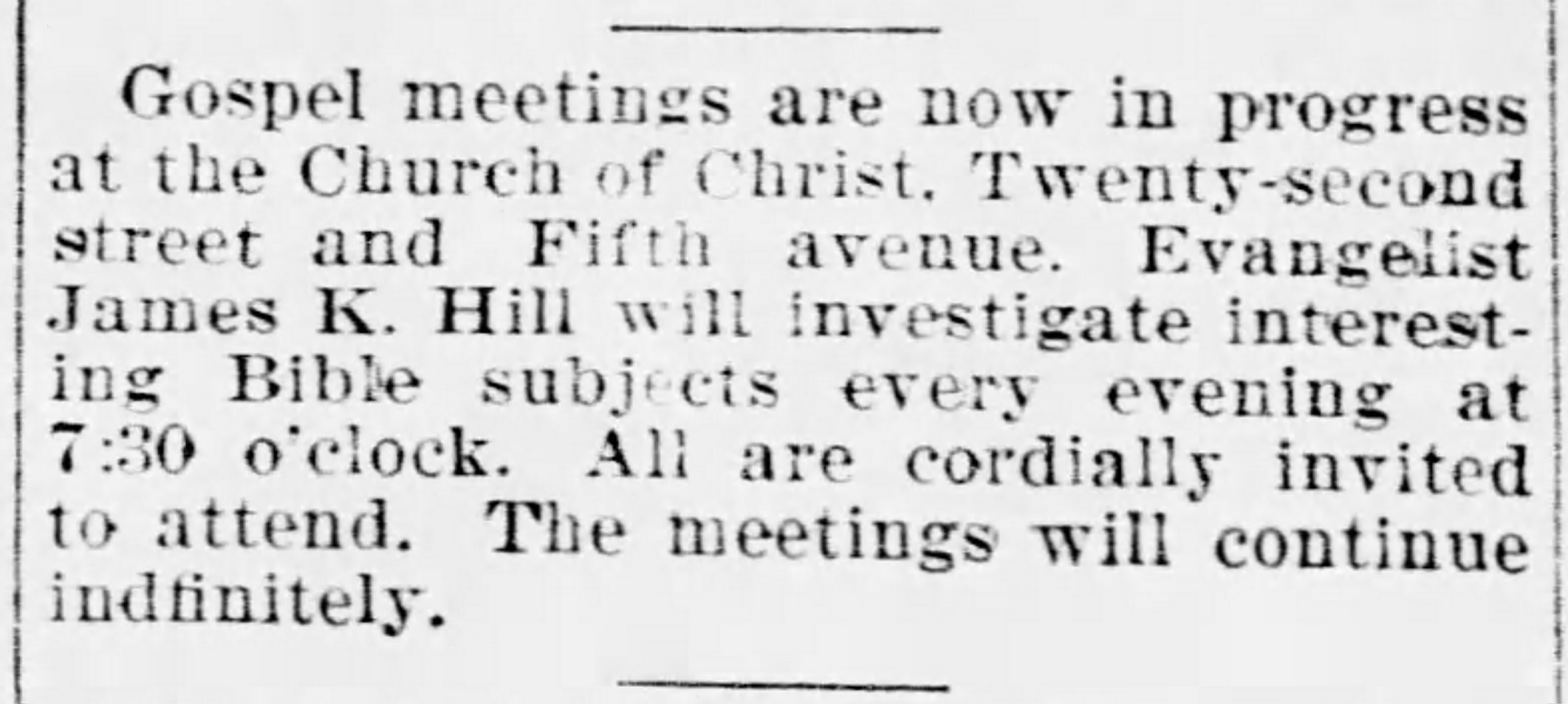
The Birmingham News, Birmingham, Alabama
Friday, September 30, 1898 page 2
![]()
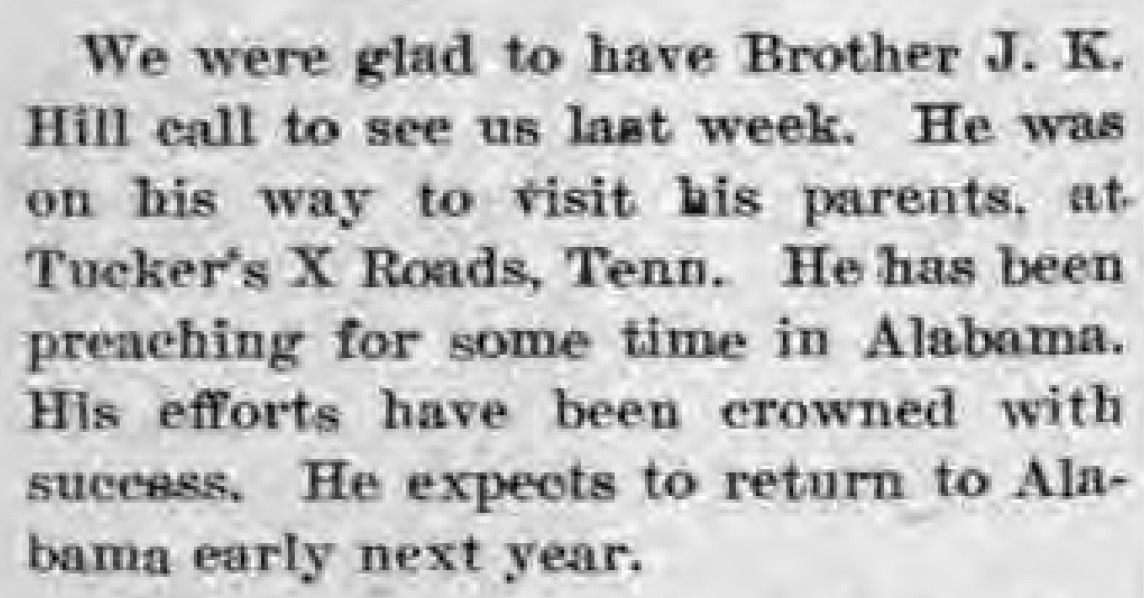
Gospel Advocate, December 12, 1901, p.789
![]()
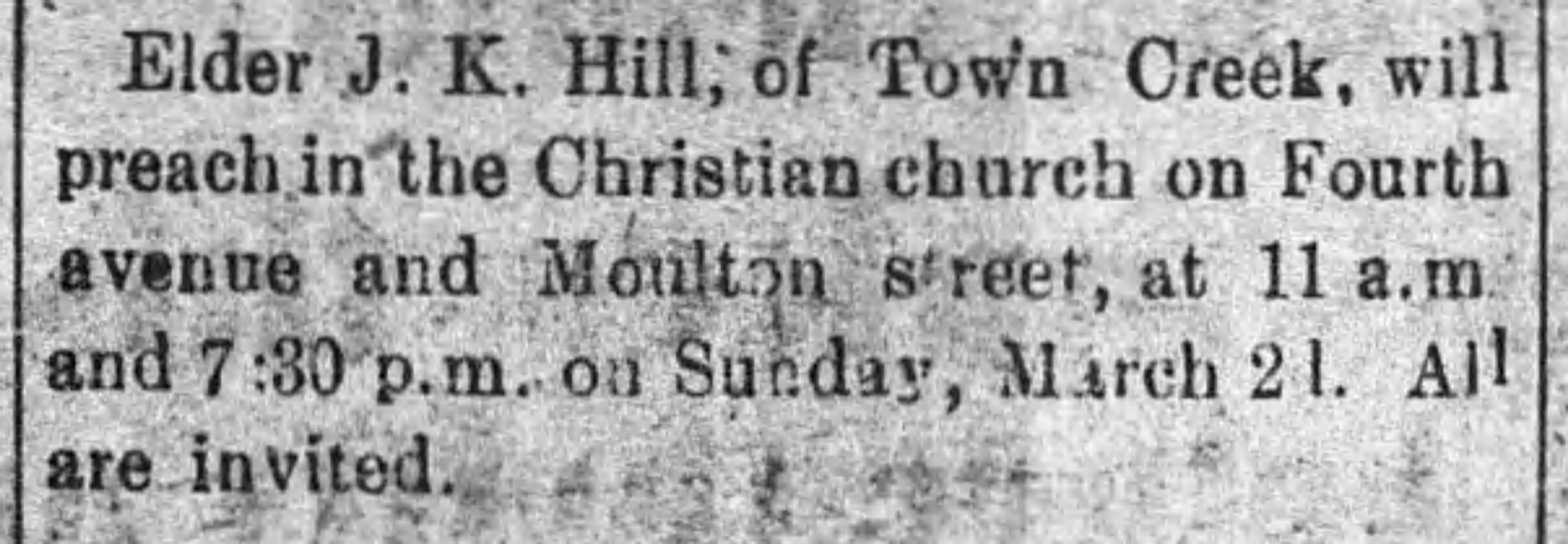
New Decatur Advertiser, Decatur, Alabama
Friday, February 21, 1902, p.3
![]()

The Leighton News, Leighton Alabama
Friday, November 28, 1902, p.2
![]()
The Leighton News, Leighton Alabama
Friday, March 13, 1903, p.4
![]()

Daily Mountain Eagle, Jasper, Alabama
Wednesday, December 9, 1903, p.8
![]()
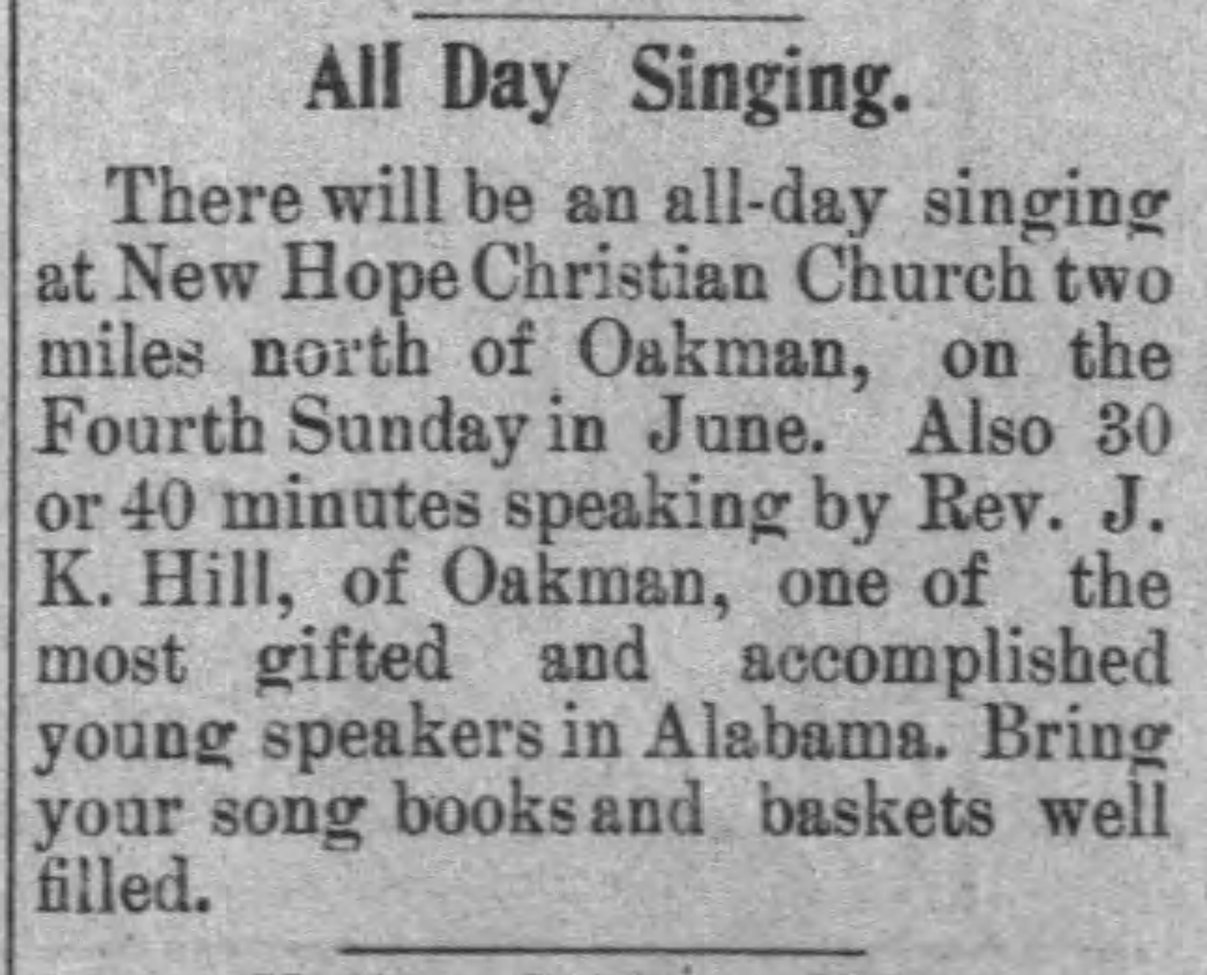
Daily Mountain Eagle, Jasper, Alabama
Wednesday, May 31, 1905, p.1
![]()
Daily Mountain Eagle, Jasper, Alabama
Wednesday, September 19 1906, p.1
![]()
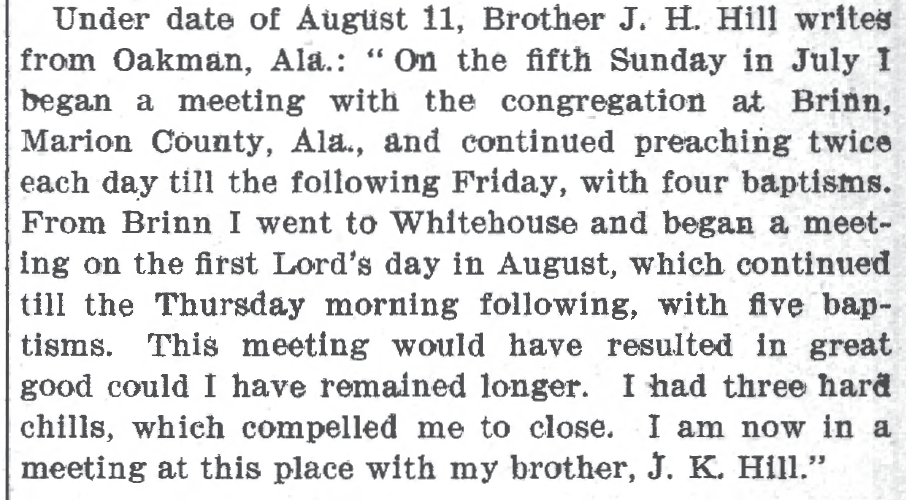
Gospel Advocate, August 23, 1906, p.533
![]()

Gospel Advocate, September 27, 1906, p.613
(Note: Bean's Creek was the home church of David Lipscomb)
![]()
Bethlehem Church of Christ
Wilson County, Tennessee
![]()
Gospel Advocate Obituary On The Life Of John M. Hill
father of James K. Hill (grave photo below)
John M. Hill.—Reference was made last week to our event meetings at Linwood and with the Bethlehem congregation. The meetings at these places closed last year with the burial of Brother Sherrol and begin this year with the burial of Brother John M. Hill. These brethren were both elders of the Bethlehem congregation and were good and influential men:—They enjoyed the confidence and respect, not only of the church, but of all their neighbors, having “good testimony”from them that are without.” As large crowds as ever assembled in the Bethlehem house of worship attended the funeral services of the two men. Brother Hill was born, in Davidson County, near Nashville, Tenn., on August 25, 1836. I am not informed as to how early life was spent. He was married to Miss Susan H. Allen, on September 16, 1858. Eight children were the fruit of this union, three of whom are dead. The surviving ones are, in order of their age, W. R. Hill, John H. Hill, Mrs. G. W. Carpenter, James K. Hill, and Mrs. Dr. L. L. Tilley. The readers of this paper are acquainted with the names of John H. Hill and James K. Hill good and useful preachers of the gospel of Christ. These young men are earnest and faithful and have already accomplished no little good in their work. Brother Hill’s daughters are faithful, dutiful, Christian wives and mothers, endeavoring to meet their obligations as “workers at home” and to so adorn the doctrine of God. Only one son remains out of the church, and but for our interest in him and an honest desire to state truly the facts in this biography no mention would be made of this. We pray that, in the goodness of God and cherishing the memory of a godly father, he may soon follow the good example which has been set him. In Brother Hill’s first efforts to serve God he became a Baptist in 1853 or 1854. He was one who studied the Bible and thought for himself; and when he saw that Christians should meet on he first day of the week to break bread (Acts 20:7), he ceased, in 1860, trying to be anything but a Christian. As he continued to study for himself, he decided, too, afterwards, that he had not been baptized with a scriptural motive and in obedience to God, and was again baptized by Brother Isaac Sewell. This action did not imply that others baptized by Baptists are not baptized with scriptural motives and in obedience to God; this was an individual act of his own and a matter which none, except himself, could settle. So it is now with people baptized by anybody. Brother Hill’s study of the Bible soon fitted him for a teacher in the church, and he was such for thirty years. He was not called a “preacher,” although he spoke in public, conducting the Lord’s-day meetings, funeral services, and prayer meetings. He occasionally wrote articles for religious papers and was for some years a regular correspondent of one of his county papers, the Lebanon Democrat. His article in any paper gave no uncertain sound; his readers cold always tell which side of the fence he was on; and he was always found on the moral side of all questions of public interest. He was interested more than the average church member, or even those called "elders," in the study of the Bible and the progress of the gospel; he studied the Bible daily, and was not with one long without saying something about it. l have known him for more than twenty years. and I never met him that be was not ready to discuss religious topics and to encourage me in preaching the gospel. So he encouraged other preachers. It was his request that I attend his funeral and preach a discourse to encourage the church, console his widow, comfort his children, and warn sinners. In these respects good was accomplished, while his life is an open book "known and read of all men.” “Even so let your light shine before men; that they may see your good works, and glorify your Father who is in heaven.” “By their fruits ye shall know them.” One’s own life—his faith in Christ and obedience to God or his unbelief and disobedience (see Rom. 2:6-11)—seals his destiny, and not the funeral discourse preached over his lifeless body. Then, by brother Hill’s acceptance of Christ and faithful continuance in well-dong, seeking for glory, honor, and immortality, we believe that he has entered upon that eternal life which God has promised to all who love and serve him. Jesus came to seek and to save the lost; and he has not left us, sinful mortals that we are, without the blessed hope of salvation and that those who die in him have already entered into that rest which remains for the people of God. How beautiful and consoling the following: “But we would not have you ignorant, brethren, concerning them that fall asleep; that ye sorrow not, even as the rest, who have no hope. For if we believe that Jesus died and rose again, even so them all that are fallen asleep in Jesus will God bring with him. For this we say unto you by the word of the Lord, that we that are alive [on the earth when Christ comes], that are left unto the coming of the Lord, shall in no wise preceded them that are fallen asleep. For the Lord himself shall descend from heaven, with a shout, with the voice of the archangel, and with the trump of God: and the dead in Christ shall raise first; then we that are alive, that are left, shall together with them be caught up in the clouds, to meet the Lord in the air; and so shall we ever be with the Lord. Wherefore comfort one another with these words!” (1 These. 4:13-18). This was written to console and comfort the bereaved, and our Father in heaven expects us to believe it and so use it. Then, while we weep over the loss of loved ones who “die in the Lord,” we also rejoice “with joy unspeakable and full of glory” in the hope of their eternal salvation. They have reached the glorious consummation of the service of God on earth; while we are left behind under life’s shadows, amidst its trials, and beneath its burdens. There can be nothing more triumphant and more victorious than a Christian’s life and death. “Blessed are the dead who died in the Lord from henceforth; yea, saith the Spirit, that they may rest from their labors; for they works follow them.” Paul says: “I have fought the good fight, I have finished my course, I have kept the faith: henceforth there is laid up for me a crown of righteousness, which the Lord the righteous judge, shall give to me at that day; and not to me only, but also to all them that have loved his appearing.” (2 Tim. 4:7,8.) Whenever one has fought this “good fight,” “finished the course,” and “kept the faith,” there can be no doubt about his receiving “the crown of righteousness.”
__________
His Life’s Purpose.—To a brother and relative Brother Hill said, shortly before he died, that, from one point of view, his life whole be considered a financial failure, but that he had never devoted his attention to making money; that he had endeavored to make an honest living and to train and educate his children for usefulness and good. This is a lofty motive, worthy of emulation, and we commend it to all. In this material age of money making and holding the proper training and education of children may be easily neglected and the true purpose of life be forgotten. Jesus asks: “Is not the life more than the food, and the body than the raiment?” He also says: “Lay not up for yourselves treasures upon the east, where moth and rust consume, and where thieves break through and steal: but lay up for yourselves treasures in heaven: . . .for where they treasure is, there will they heart be also.” “No man can serve tow masters: for either he will hate the one, and love the other; or else he will hold to one, and dispose the other. Ye cannot serve God and mammon. . . .But seek ye first his kingdom, and his righteousness; and all these things shall be added unto you.” (Matt. 6:19-24). Furthermore, he says: “Take heed, and keep yourselves from all covetousness: for a man’s life consisteth not in the abundance of the things which he possesseth.” (Luke 12:15.) Life’s true purposes and aims are much higher and nobler than to eat food, wear clothes, and accumulate property. Industry, economy, and employment in some honest occupation are taught int eh Bible and the motives for such are as clearly indicated as the motive for obedience to God in any other commandment; while idleness and improvidence are condemned. Industry, economy, and work, and their products, are not sins; they may be misused and abuse, which is a sin. It is a woeful mistake to rear one’s children with the idea that money is the principal thing of life. How well Brother Hill succeeded in his purpose the facts concerning his children stated above show. His widow, children, and relatives have or Christian sympathy; but while we weep with them over their loss, we rejoice with them in the hope of Brother Hill’s eternal salvation. The faithful mother can lean on the strong arms of her children, who will, in tenderness and love, lead her gently down the remaining steps of life until the good Master calls his servant home.
-E.A. Elam, editor, Gospel Advocate, September 1, 1904, page 545
![]()
Gospel Advocate Obituary For Susan H. Hill,
mother of J. K. Hill (grave photo below)
THE LIFE OF A GOOD WOMAN.-Such a life reminds us that we can make our lives useful and good and encourages us to do so. The false and covetous prophet, Balaam, was made to say by the Spirit of God: "Let me die the death of the righteous, and let my last end be like his." However one may live, he would die in hope of eternal life. But to reach the end of a righteous man, one must run the race of a righteous man; to die the death of the righteous, he must have lived such a life. Of this we may feel assured: one cannot run the race of the righteous in steadfastness unto the end and reach the end of the unrighteous; he cannot "live soberly and righteously and godly in this present world" and die the death of the unrighteous. While he lives this life in faith he may confidently look "for the blessed hope and appearing of the glory of the great God and our Savior Jesus Christ." While realizing this earth is not his home, he looks " for the city which hath the foundations. whose builder and maker is God." Such a life the life of Sister Susan H. Hill will encourage all to strive to live.
__________
The most important facts in this life are as follows: Susan H. Allen, daughter of J. H. Allen, was born in Wilson County, Tenn., on September 19, 1840; was married to John M. Hill, of the same county, on September 16, 1858; became the mother of eight children, five of whom survive her; became a member of the church of Christ under the preaching of Brother Jesse L. Sewell, by whom she was baptized, in 1864 · was faithful unto the end; and departed this life on January 1, 1907, being sixty-six years, three months, and twelve days of age. "Thou shalt come to thy grave in a full age, like as a shock of grain cometh in in its season." Sister Hill was of Methodist parentage and was brought up under that influence; but as she studied the word of God and heard it preached in its simplicity, she saw more and more clearly here duty to obey its simplicity and to be in religion a Christian only; hence by faith she was buried with her Lord in baptism, wherein also she arose with him and made it her son stand effort to walk in that new life in which such obedience placed her. As the word of God teaches, she was a worker at home, and endeavored to make it a place of peace and rest for her husband and children. She was a faithful wife, and the heart of her husband safely trusted I her. He preceded her to "the better land" two and one-half years. She was a godly mother, especially devoted to her children, and made a faithful effort to rear them in the fear and favor of God. All her children who survive her are in the church, except one, and that one, we trust, will soon follow the good example and heed the wise admonition of his departed father and mother. As is the case with the other children, may the God of his father and mother be his God; their Savior, his Savior, too; and their home in heaven, his eternal home. Sister Hill loved the church and was a faithful attendant upon the public services of God. She studied the Bible regularly and contended for a close application of its precepts and principles in daily life. The children who survive her are: W. R. Hill, J. K. Hill, and Mrs. L. L. Tilly, Lebanon, Tenn.; J. H. Hill, Hartselle, Ala.; and Mrs. G. W. Carpenter, Carthage, Tenn. The readers of this paper are somewhat familiar with the names of J. K. Hill and J. H. Hill, two preachers of the gospel. It does well for one family to send out two preachers. These loyal to the New Testament order of things, and thus honor the name of their God and show themselves worthy of the rich inheritance of the good name left them by their father and mother. The daughters mentioned are imitating the virtues of home making which adorned the character of their mother.
-GA, May 9, 1907, page 289
![]()
Directions To The Grave of James K. Hill
The Hill family plot is located in the Bethlehem Cemetery in Wilson County, Tennessee. It is located on the Trousdale Ferry Pike, Hwy. 141, East of Nashville, Tennessee that I-40 just east of Lebanon to the Tucker's Crossroads exit. Take the exit and head north (left). Go to the blinking light and turn right. You will pass Bethlehem church of Christ on the left, and a little further on you will come to the cemetery on the right. The Hill plot is near the highway at the east end. For exact utilize GPS and pictures below.
GPS Location
36°12'02.9"N 86°08'51.5"W
36.200799, -86.147624
![]()
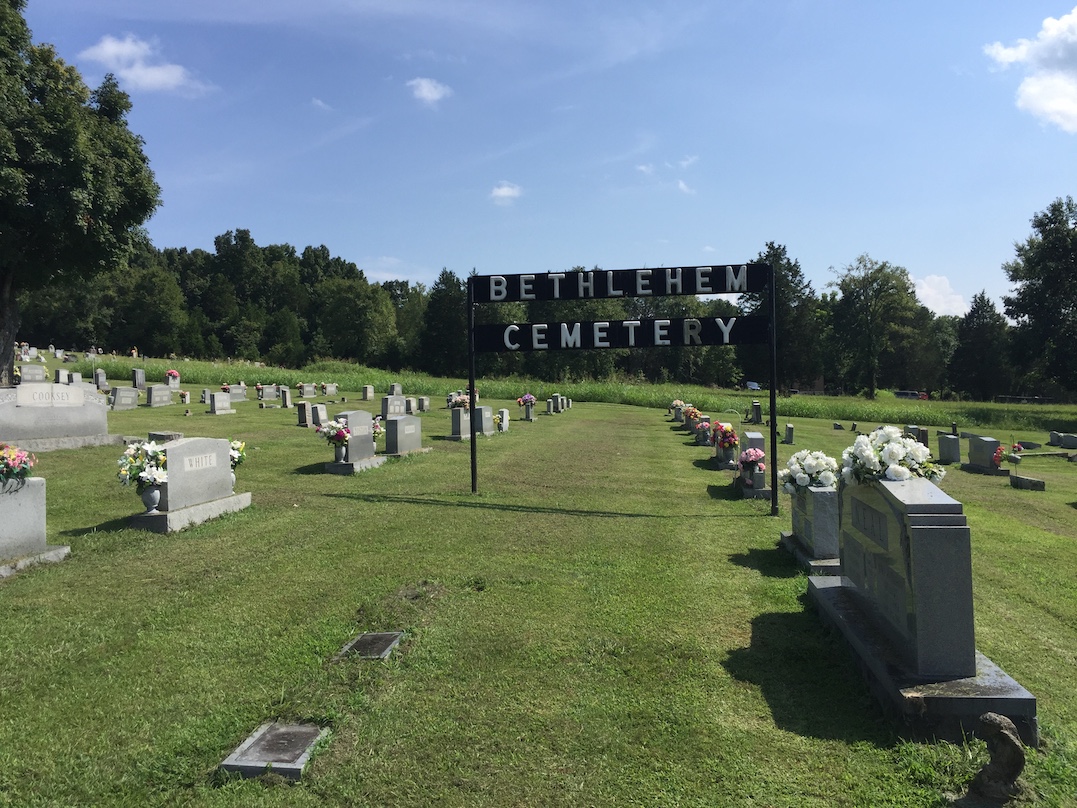
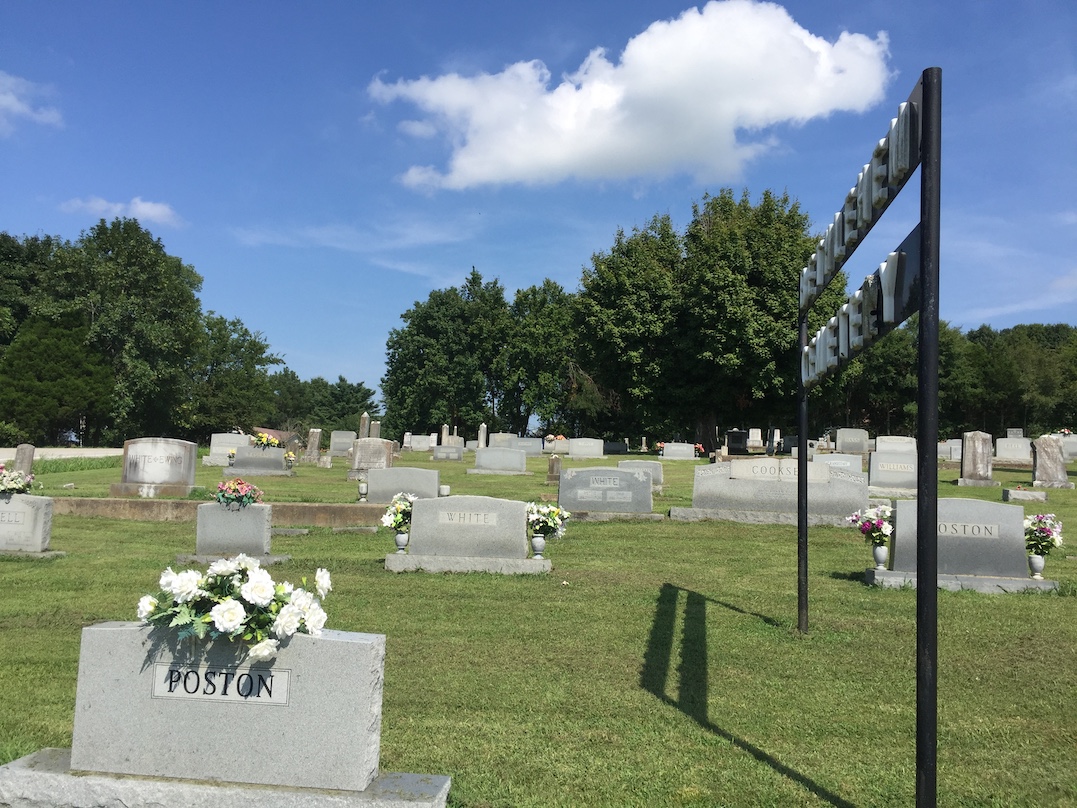
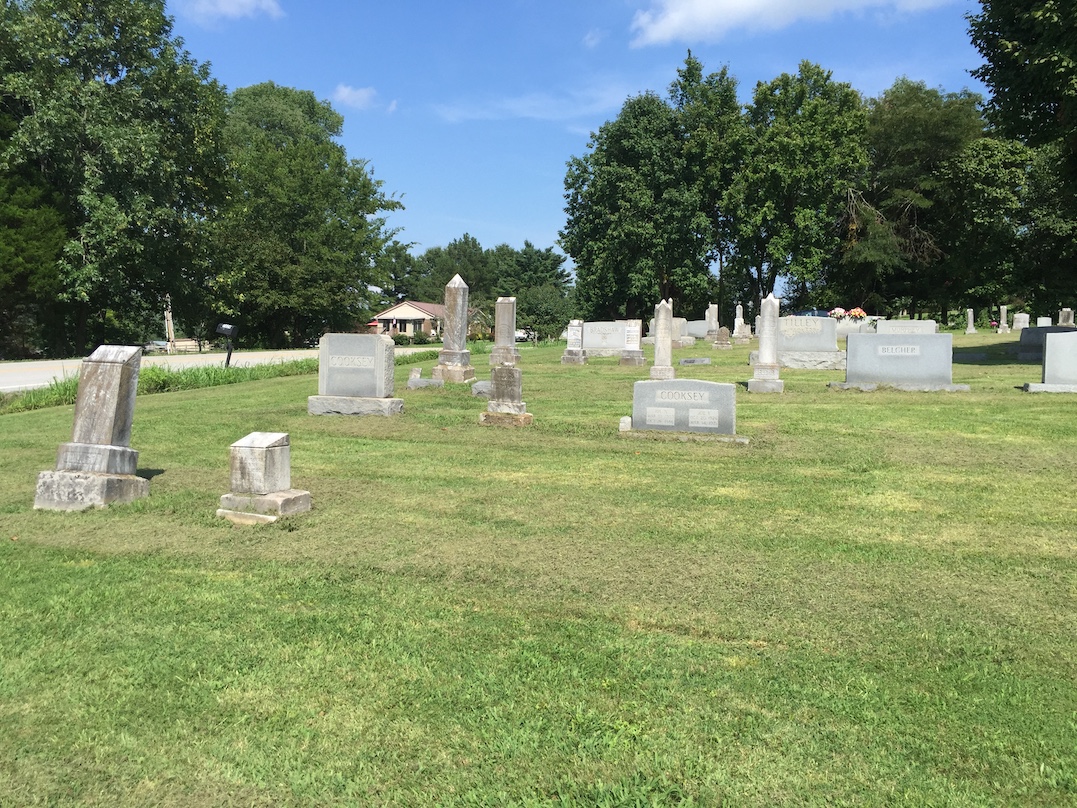
Hill Plot in the center distance
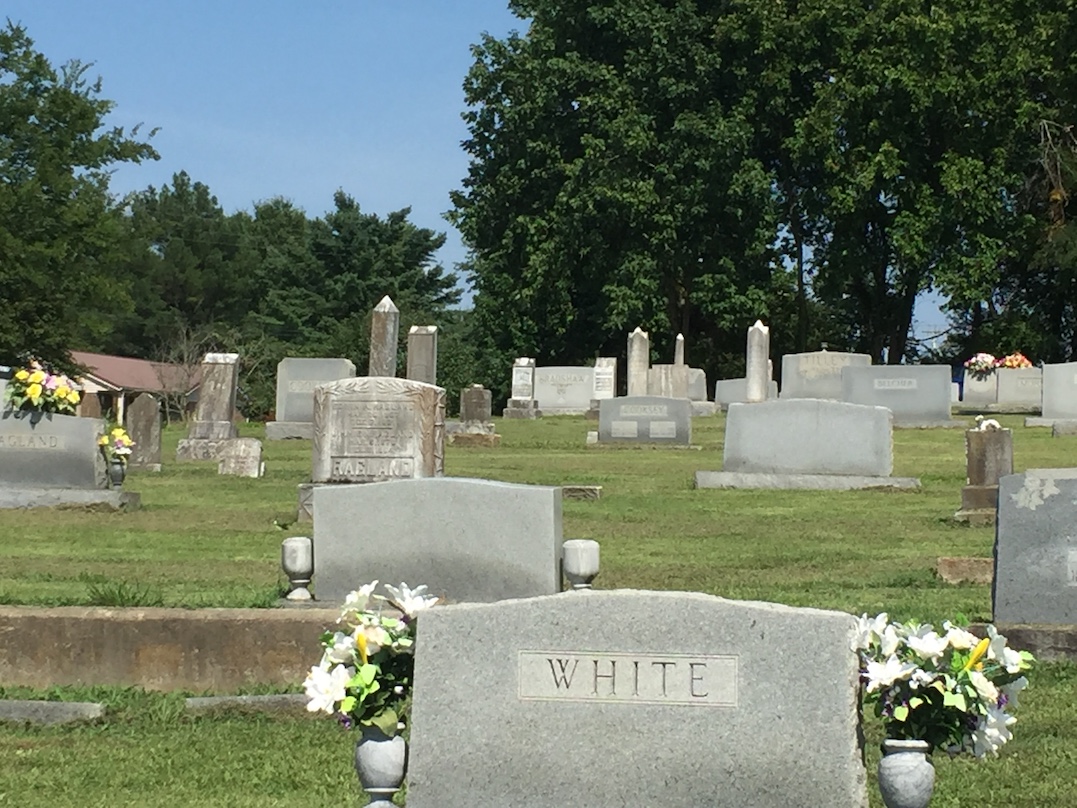

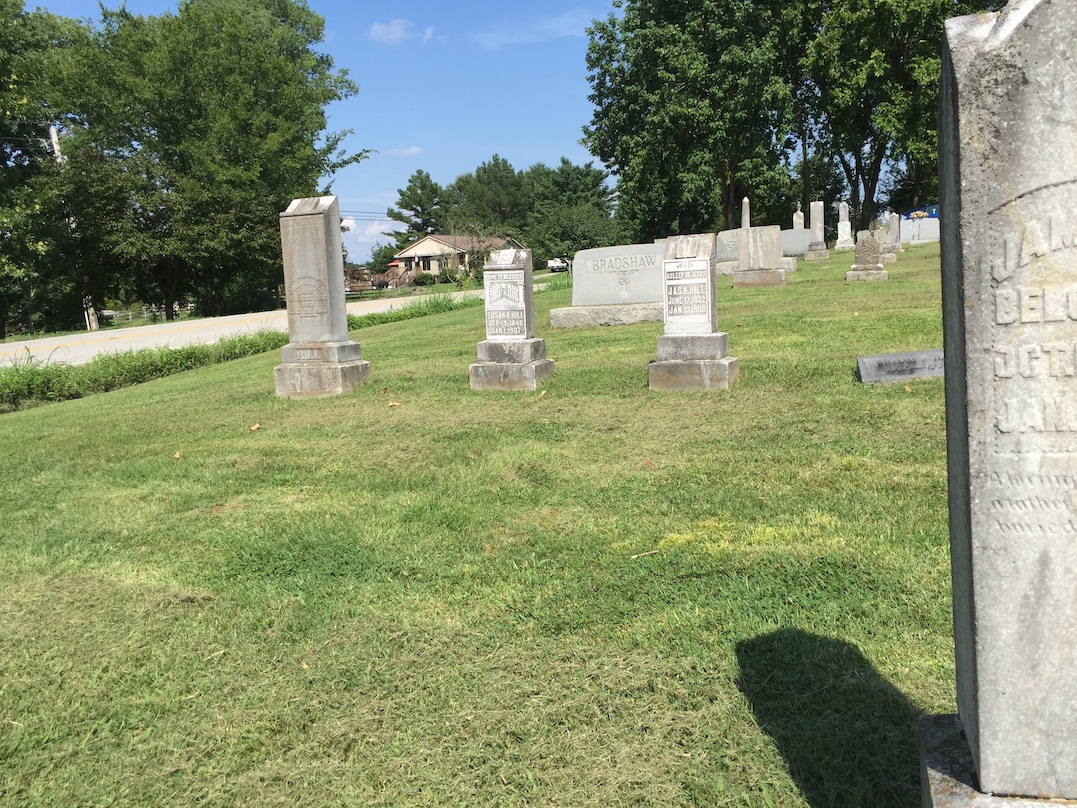
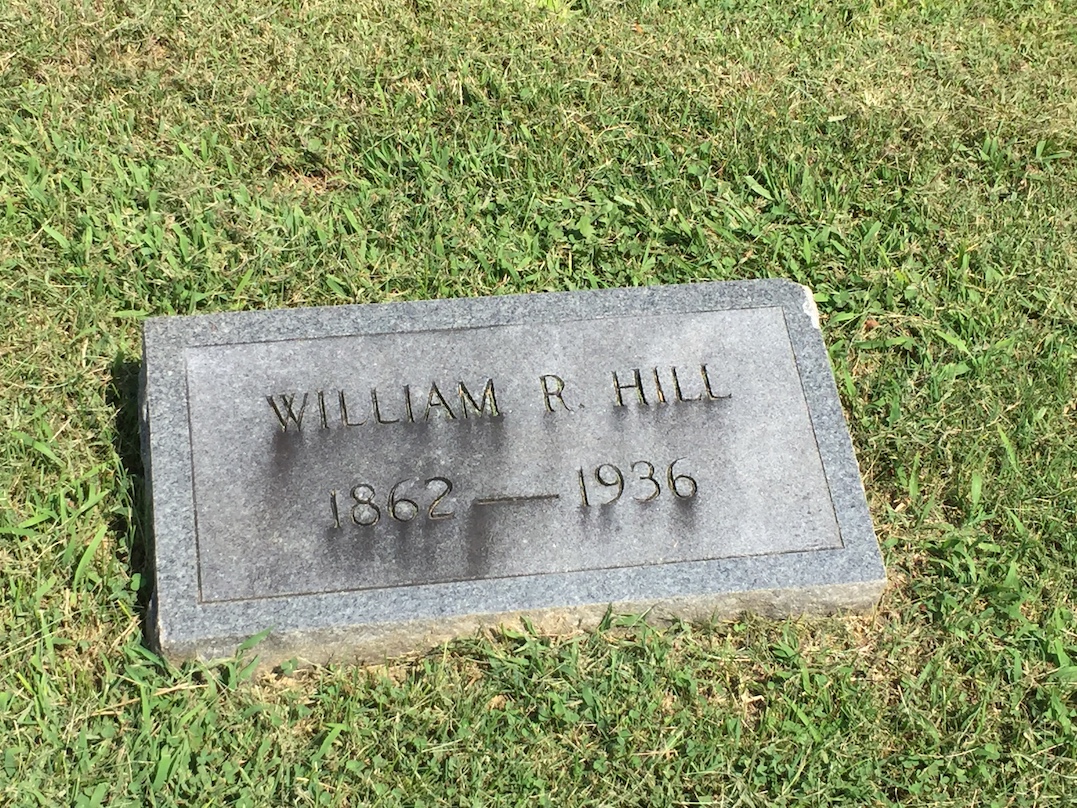
William R. Hill
1862-1936
brother of James K. Hill
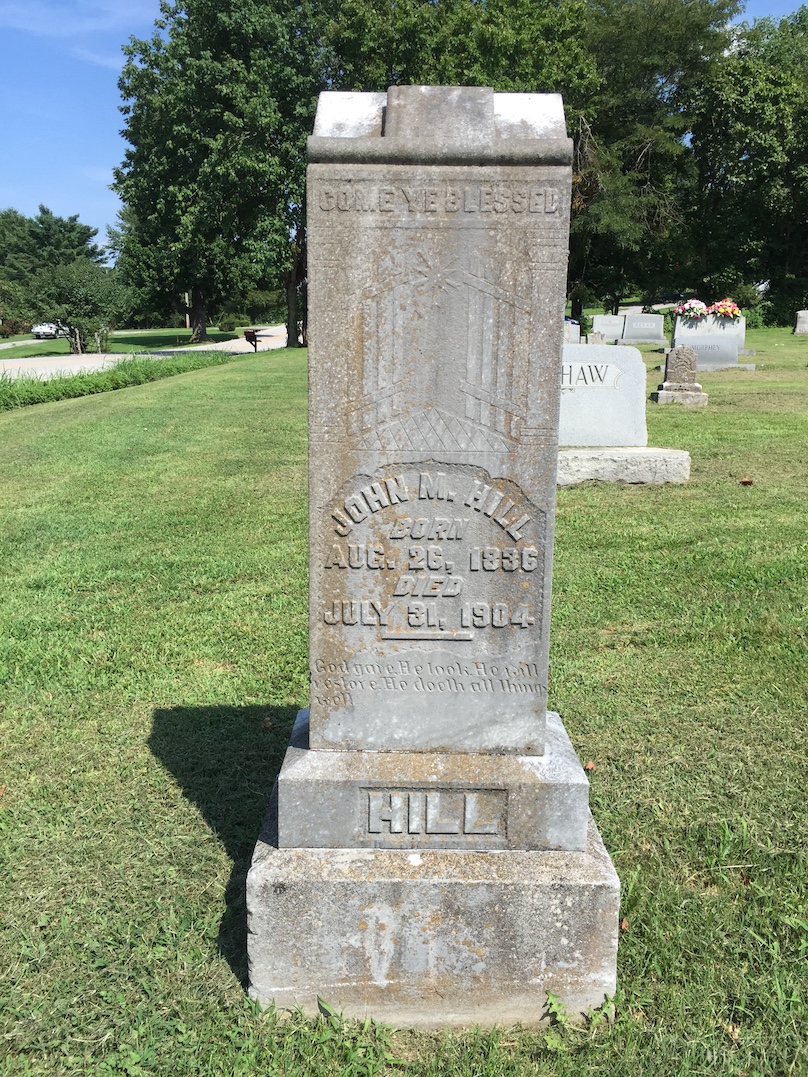
Come Ye Blessed
John M. Hill
Born August 26, 1836
Died July 31, 1904
God gave, He took, He will restore
He doeth all things well
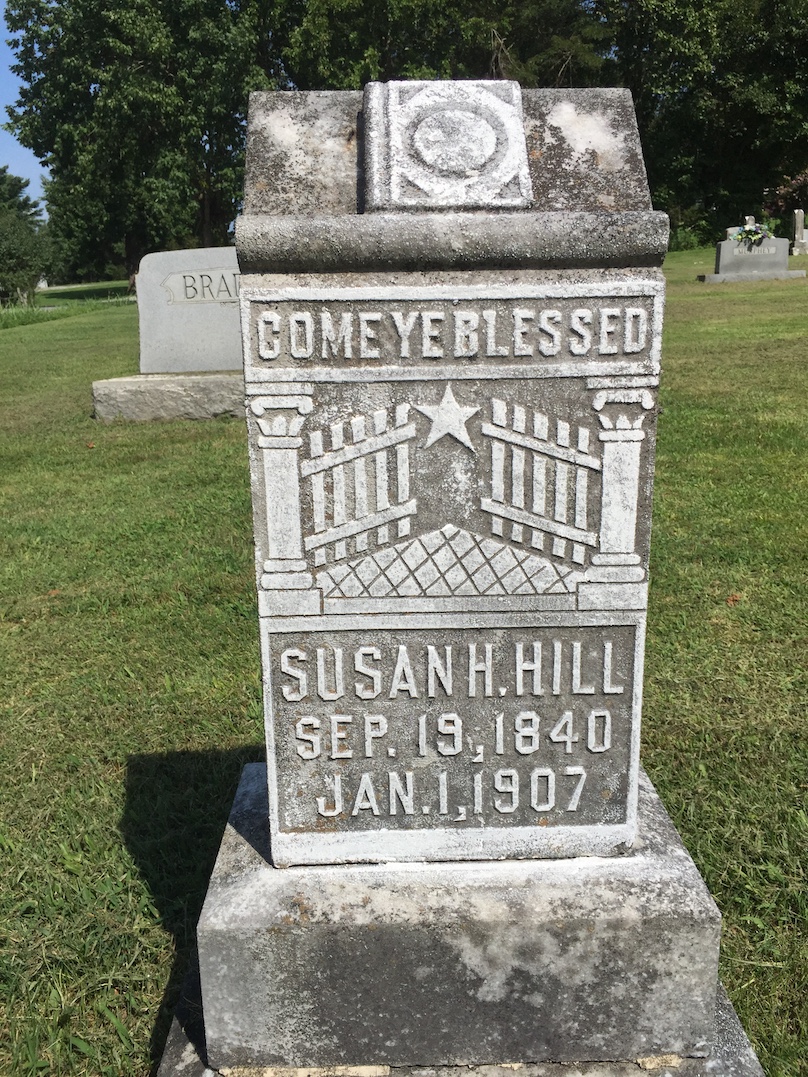
Come Ye Blessed
Susan H. Hill
September 19, 1840
January 1, 1907
James K. Hill's mother
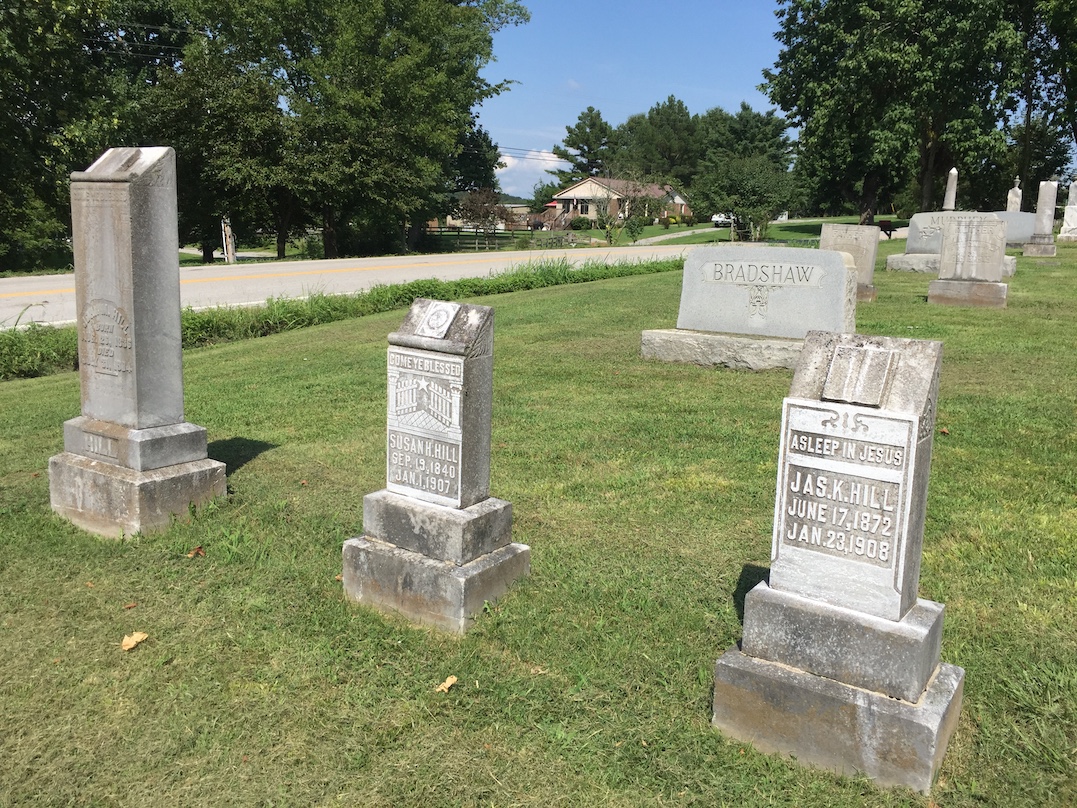
Asleep In Jesus
James K. Hill
June 17, 1908
January 23, 1908
![]()
Grave Photos Taken 08.06.2016
Webpage produced 02.19.2021
Courtesy Of Scott Harp
www.TheRestorationMovement.com
Webeditor Note: The name of James K. Hill came across my radar a few years ago while researching The Sage Of Jasper, a biography on the life of Gus Nichols. It was not until 2016 that I had the opportunity to go and search for brother Hill's grave. His connection to North Alabama, my home, and the influence he imparted there, in many ways has trickled down to me, and it is my joy to remember him here on this webpage. I would love to find a photo of brother Hill, and if one can be found we will soon after display it here on this page.
![]()
